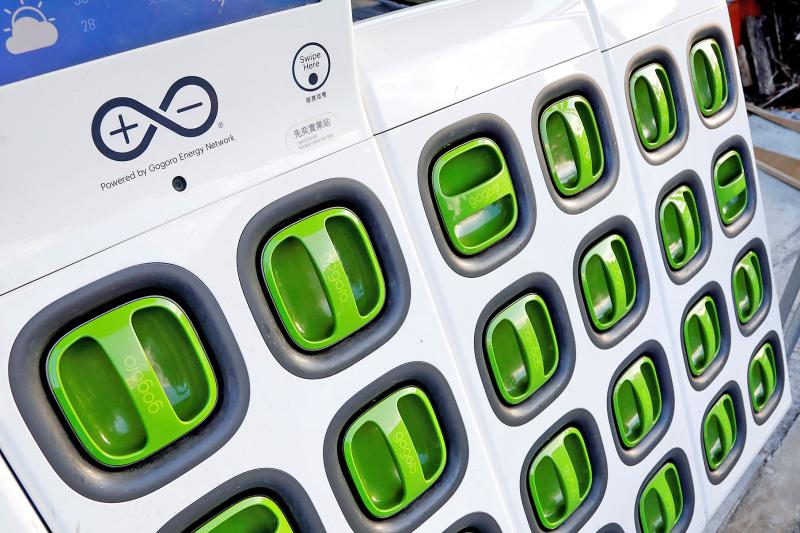Electric scooter maker Gogoro Inc (睿能創意) this year expects its number of electric battery swapping stations to outstrip the number of gas stations in the nation following seven years of deployment, a sign that electric two-wheelers are gaining traction.
As of the end of last year, Gogoro had built 2,215 GoStations nationwide, mostly in urban areas, up from 1,937 in 2020.
The number of gas stations operated by CPC Corp, Taiwan (台灣中油) and Formosa Petrochemical Corp (台塑石化) was 2,487.

Photo: Tyrone Siu, Reuters
“By the end of this year, we are very confident that the number of battery swapping stations will surpass the number of gas stations nationwide,” Gogoro vice president for energy services Alan Pan (潘璟倫) told a news conference yesterday.
Gorogo aims to deploy more large-scale electric battery swapping stations, dubbed Super GoStations, and other stations in collaboration with government agencies, Pan said.
The company also plans to add battery stations in more remote areas, he said.
Gogoro’s 453,300 riders can swap batteries at GoStations located in 7-Eleven convenience stores, and even one in Nantou County’s Wuling (武嶺) on Hehuanshan (合歡山), the highest highway in Taiwan.
New vehicle sales by Gogoro and its partners in the Powered by Gogoro Network (PBGN) contracted 5.2 percent year-on-year to 93,999 units last year, outperforming the overall scooter market, in which sales plunged 21.9 percent year-on-year.
PBGN members include Yamaha Motor Co, Aeon Motor Co (宏佳騰), Motive Power Industry Co (摩特動力) and Suzuki Motor Corp.
Gogoro chief product officer Peng Ming-i (彭明義) expects new electric vehicle sales to return to growth this year.
The penetration rate of electric scooters is also forecast to climb this year, compared with 11.6 percent last year, up from 9.6 percent in 2020.
Peng declined to provide further forecasts ahead of Gogoro’s debut on the US market.
Gogoro, Yamaha, Aeon and Suzuki are scheduled to launch new models later this year, which would also provide growth momentum.

Micron Memory Taiwan Co (台灣美光), a subsidiary of US memorychip maker Micron Technology Inc, has been granted a NT$4.7 billion (US$149.5 million) subsidy under the Ministry of Economic Affairs A+ Corporate Innovation and R&D Enhancement program, the ministry said yesterday. The US memorychip maker’s program aims to back the development of high-performance and high-bandwidth memory chips with a total budget of NT$11.75 billion, the ministry said. Aside from the government funding, Micron is to inject the remaining investment of NT$7.06 billion as the company applied to participate the government’s Global Innovation Partnership Program to deepen technology cooperation, a ministry official told the

Taiwan Semiconductor Manufacturing Co (TSMC, 台積電), the world’s leading advanced chipmaker, officially began volume production of its 2-nanometer chips in the fourth quarter of this year, according to a recent update on the company’s Web site. The low-key announcement confirms that TSMC, the go-to chipmaker for artificial intelligence (AI) hardware providers Nvidia Corp and iPhone maker Apple Inc, met its original roadmap for the next-generation technology. Production is currently centered at Fab 22 in Kaohsiung, utilizing the company’s first-generation nanosheet transistor technology. The new architecture achieves “full-node strides in performance and power consumption,” TSMC said. The company described the 2nm process as

Shares in Taiwan closed at a new high yesterday, the first trading day of the new year, as contract chipmaker Taiwan Semiconductor Manufacturing Co (TSMC, 台積電) continued to break records amid an artificial intelligence (AI) boom, dealers said. The TAIEX closed up 386.21 points, or 1.33 percent, at 29,349.81, with turnover totaling NT$648.844 billion (US$20.65 billion). “Judging from a stronger Taiwan dollar against the US dollar, I think foreign institutional investors returned from the holidays and brought funds into the local market,” Concord Securities Co (康和證券) analyst Kerry Huang (黃志祺) said. “Foreign investors just rebuilt their positions with TSMC as their top target,

POTENTIAL demand: Tesla’s chance of reclaiming its leadership in EVs seems uncertain, but breakthrough in full self-driving could help boost sales, an analyst said Chinese auto giant BYD Co (比亞迪) is poised to surpass Tesla Inc as the world’s biggest electric vehicle (EV) company in annual sales. The two groups are expected to soon publish their final figures for this year, and based on sales data so far this year, there is almost no chance the US company led by CEO Elon Musk would retain its leadership position. As of the end of last month, BYD, which also produces hybrid vehicles, had sold 2.07 million EVs. Tesla, for its part, had sold 1.22 million by the end of September. Tesla’s September figures included a one-time boost in